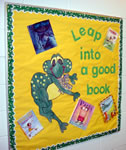Volunteers can play a critical role in the learning community.
 Volunteer parents, community members, and students can have a tremendous impact on your program. When funding for paid support staff is not available, the daily operation of the library media center may be supervised by volunteers. Volunteers often make reading tutorial programs, after school clubs, and books fairs possible.
Volunteer parents, community members, and students can have a tremendous impact on your program. When funding for paid support staff is not available, the daily operation of the library media center may be supervised by volunteers. Volunteers often make reading tutorial programs, after school clubs, and books fairs possible.
Occasionally students are assigned in a school library media center as paid workers through a “school-to-work” or vocational education program. More often, student workers are children or young adult volunteers.
How can a volunteer program be developed?
Keys to effectively administering library media volunteers involve planning, promotion, placement, training, and appreciation.
Planning. To insure that you identify the needs to be met by volunteer workers, a good plan is essential. Consider the different types of volunteers that are needed. What roles will they play?
Promotion. Promote your need for volunteers as an ongoing program. For example, you might give your volunteer staff a team name and matching T-shirts, buttons, or badges. Give them a sense of purpose and identity. The more visible they become, the easier it will be to recruit more.
Placement. Not all volunteers work well independently. In some cases, they cause more problems than they solve. As a result, they should be carefully selected and placed into positions that fit their skills and personality. For example, one person might work best alone and would be happy shelving books. While another person might be most comfortable reading to a group of children.
Many volunteers come with special skills. Be sure to ask. Volunteers are often retired teachers or skilled computer operators. Make use of their expertise. Volunteers have assisted in writing grants, creating hardware budgets, and designing marketing strategies.
Training. Many tasks require specific skills. Mini-lessons can be used to teach basic skills such as checking books in and out or using the electronic databases. It's most efficient to keep these directions in electronic files or create a notebook of "how to" tutorials.
Another approach is to create self-running PowerPoint Presentations containing your voice talking through a process. Regardless of the approach, volunteers feel much more comfortable when they are confident in their task.
Appreciation. Be sure to thank your volunteers. Insure that volunteers know that their contributions are needed and appreciated. Genuinely show that your appreciate their work every time you see them.
Recognize them and include them in special celebrations. Make them feel that they are a part of the library media center.
What types of people make good volunteers?
People of all ages and background can be successful volunteers.
Parents. Parents often enjoy volunteering in their child's school. However before making a commitment to a parent, check with the classroom teacher. In some cases, the teacher may have experience working with this person. Keep in mind that some parents aren't interested in volunteering once their child leaves the school, so their volunteer work may be short-term.
Community Members. Some community members have not had experiences working in the culture of a school. They may not be aware of "no gum" rules or think about things such as appropriate language. It's unlikely that a criminal would choose to join your volunteer staff. However be aware that this can happen.
Many schools have successfully involved older people, sometimes grandparents and persons from retirement communities.
Students. Students often have great skills to share. For example, a student “techie” may be knowledgeable of computers and could troubleshoot equipment/software problems, assist in the lab area, or complete vital repairs. Older children enjoy reading and working with younger children.
Many schools develop entire programs for student volunteers. At the high school level, cadet librarian programs are a great way for students to learn about the profession.
What is involved with supervising volunteers?
Volunteers can perform routine but necessary tasks freeing up library media center staff for other tasks and duties. But in order to be effective, volunteers must be matched with appropriate assignments and instructed or guided to meet performance requirements. Typical tasks often performed by volunteers are creating bulletin boards, checking out materials, shelving materials, reading to students, completing routine maintenance tasks, greeting students and teachers, and adopting a shelf.
![]() Read Supervision of Volunteers / Student Aides
Read Supervision of Volunteers / Student Aides
Read Suzanne Gill’s Using Volunteers Effectively in a School Library Media Center, 2000 for additional guidelines and tips for volunteers in a school library media setting. Volunteers can be school librarians' best friends. And, conversely, volunteering in a school library can be intrinsically rewarding to the volunteers. To nurture this relationship is a goal of this manual.
Check Your Understanding
![]() Information
Power - Program Administration: Principle 3.
Information
Power - Program Administration: Principle 3.
An effective library media
program requires a level of professional and support staffing that is
based upon a school’s instructional programs, services, facilities,
size, and numbers of students and teachers.
Your predecessor preferred to work alone, so never developed a volunteer program. You believe your program might benefit from volunteers. Develop a program for recruiting, training, and supervising volunteers. In your plan, identify specific purpose(s) and activities of volunteers.
Make It Real
 What policies do you need to handle issues that might arise relating to volunteers?
What policies do you need to handle issues that might arise relating to volunteers?
Use the following websites to help you create a policy.
Volunteers from Elementary Librarian's Handbook, Puyallup WA School District
Volunteers from Library Procedures Manual, Georgetown TX Independent School District
Read More About It
Gill, S.L. Using Volunteers Effectively in a School Library Media Center, 2000.
http://www.slgill.com/vol.htm
Volunteers from Elementary Librarian's Handbook, Puyallup WA School District
http://www.puyallup.k12.wa.us/...
Contains a Classroom Volunteer/Visitor Code of Conduct and list of traditional volunteer tasks.
Volunteers from Library Procedures Manual, Georgetown TX Independent School District
http://www.georgetownisd.org/...
Sample list of tasks.